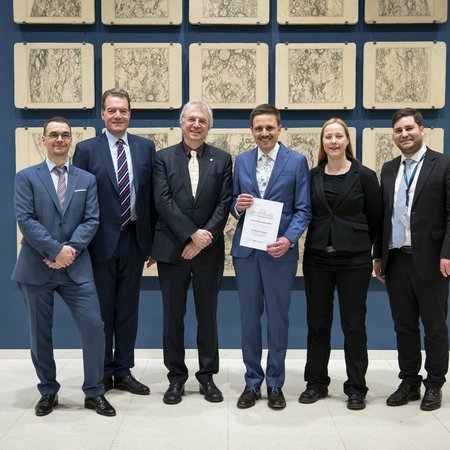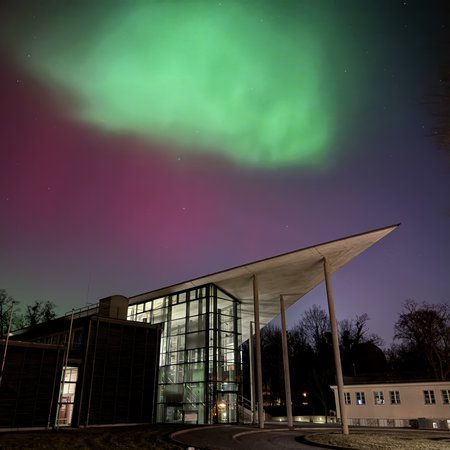Jean-Michel Désert leads new section ‘Exoplanets and their Atmospheres’
In November 2025, Jean-Michel Désert became head of the ‘Exoplanets and their Atmospheres’ section at the Leibniz Institute for Astrophysics Potsdam (AIP). His research focuses on determining the climates and atmospheric chemical compositions of distant worlds to uncover clues about planet formation and the potential habitability of exoplanets.
An important aspect of his work explores the intricate relationship between exoplanet atmospheres and their stellar environments, using the Sun as a key reference. By combining space- and ground-based observations with advanced theoretical modeling, he seeks to deepen our understanding of these diverse planetary systems—and of our own place in the cosmos.
‘It’s a real privilege to be working with my team at AIP to uncover the diversity of exoplanetary atmospheres at such an exciting and groundbreaking moment for the field,’ says Jean-Michel Désert. ‘Using state-of-the-art instruments and cutting-edge data modeling across multiple wavelengths, we’re working to uncover how exoplanetary atmospheres form and how their stars might influence their potential habitability.'
Désert graduated in 2009 at the Institut d'Astrophysique de Paris (France) in the field of exoplanet atmospheres. This was followed by postdoctoral positions at the Harvard–Smithsonian Centre for Astrophysics (USA), where he worked on NASA's Kepler mission and developed innovative methods for analysing exoplanetary atmospheres. He was subsequently awarded the renowned Carl Sagan Fellowship at the California Institute of Technology (Caltech). In 2013, he began an assistant professorship at the University of Colorado Boulder (USA) before moving to the Anton Pannekoek Institute for Astronomy at the University of Amsterdam (Netherlands) in 2015. His research focuses on the detection and characterisation of exoplanetary atmospheres using both space-based and ground-based observatories such as the James Webb Space Telescope (JWST), Hubble Space Telescope (HST), Spitzer and the Very Large Telescope (VLT), while actively preparing for the near future with project like ESA’s PLATO mission and the Extremely Large Telescope (ELT). Désert has been awarded for his scientific achievements, including an ERC Starting Grant, and a NWO Vidi grant. In Amsterdam, co-founded a center for the study of the origins of life, taught planetary sciences and astrobiology courses, and he mentored and supervised early-career scientists. He also collaborated with international research programs involving comparative studies of numerous planetary systems– an approach that contributes significantly to our understanding of the formation and evolution of planets.
‘Jean-Michel Désert is an internationally renowned scientist who will significantly strengthen exoplanet research at the institute and further expand its relationship with international observation programmes and theoretical models,’ said Prof. Dr. Katja Poppenhäger, director of the research branch Stellar, Solar and Exoplanetary Physics at the AIP.
In November 2025, Jean-Michel Désert became head of the ‘Exoplanets and their Atmospheres’ section at the Leibniz Institute for Astrophysics Potsdam (AIP). His research focuses on determining the climates and atmospheric chemical compositions of distant worlds to uncover clues about planet formation and the potential habitability of exoplanets.
An important aspect of his work explores the intricate relationship between exoplanet atmospheres and their stellar environments, using the Sun as a key reference. By combining space- and ground-based observations with advanced theoretical modeling, he seeks to deepen our understanding of these diverse planetary systems—and of our own place in the cosmos.
‘It’s a real privilege to be working with my team at AIP to uncover the diversity of exoplanetary atmospheres at such an exciting and groundbreaking moment for the field,’ says Jean-Michel Désert. ‘Using state-of-the-art instruments and cutting-edge data modeling across multiple wavelengths, we’re working to uncover how exoplanetary atmospheres form and how their stars might influence their potential habitability.'
Désert graduated in 2009 at the Institut d'Astrophysique de Paris (France) in the field of exoplanet atmospheres. This was followed by postdoctoral positions at the Harvard–Smithsonian Centre for Astrophysics (USA), where he worked on NASA's Kepler mission and developed innovative methods for analysing exoplanetary atmospheres. He was subsequently awarded the renowned Carl Sagan Fellowship at the California Institute of Technology (Caltech). In 2013, he began an assistant professorship at the University of Colorado Boulder (USA) before moving to the Anton Pannekoek Institute for Astronomy at the University of Amsterdam (Netherlands) in 2015. His research focuses on the detection and characterisation of exoplanetary atmospheres using both space-based and ground-based observatories such as the James Webb Space Telescope (JWST), Hubble Space Telescope (HST), Spitzer and the Very Large Telescope (VLT), while actively preparing for the near future with project like ESA’s PLATO mission and the Extremely Large Telescope (ELT). Désert has been awarded for his scientific achievements, including an ERC Starting Grant, and a NWO Vidi grant. In Amsterdam, co-founded a center for the study of the origins of life, taught planetary sciences and astrobiology courses, and he mentored and supervised early-career scientists. He also collaborated with international research programs involving comparative studies of numerous planetary systems– an approach that contributes significantly to our understanding of the formation and evolution of planets.
‘Jean-Michel Désert is an internationally renowned scientist who will significantly strengthen exoplanet research at the institute and further expand its relationship with international observation programmes and theoretical models,’ said Prof. Dr. Katja Poppenhäger, director of the research branch Stellar, Solar and Exoplanetary Physics at the AIP.
Images
Prof. Dr. Jean-Michel Désert
Big screen size [1000 x 747, 70 KB]
Original size [2000 x 1494, 250 KB]





